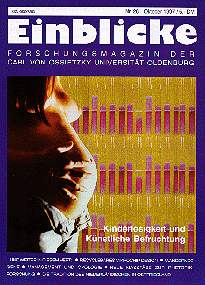Presse & Kommunikation
| EINBLICKE NR.26 | OKTOBER 1997 |
|
FORSCHUNGSMAGAZIN DER CARL VON OSSIETZKY UNIVERSITÄT OLDENBURG
|
|

Inhalt
- Kinderlosigkeit und Künstliche Befruchtung
- Recyclebares Mikrochip-Design
- Wandernde Gene
- Ökologische Unternehmensführung oder: Wie werden die Bösen die Guten?
- Quellenbibliographie setzt neue Maßstäbe zur Rhetorikforschung
- Die Tradition des Niederländischen in Ostfriesland
- Nachrichten der Universitätsgesellschaft
- Notizen aus der Universität
- Summaries
Sociology:
Childlessness and Artificial Fertilization
Medicine today not only provides reliable methods of contraception, but can also make it possible that the number of childless marriages in the industrialised countries will increase no further. Married women, often after a long period of contraception, expose themselves to in-vitro-fertilisation treatments, which are seldom successful. Their motives lie to a great extent in a traditional view of family and the postponement of its fulfilment for too long. This is one of the results of a research project in the sociology of reproductive medicine.Authors: Rosemarie Nave-Herz, Corinna Onnen-Isemann
Information Science:
Recycling of Microchip Design
The penetration of computers and microelectronics into all domains of social and business life is unique in industry. This article explains the background of this development, the enabling technology and future challenges. A solution for the most demanding problem, how to design microchips with tens of millions of transistors, is presented: reuse of intellectual property.Author: Wolfgang H. Nebel
Genetics:
Wandering Genes
Genetic information is inherited from parents to offspring, a process termed vertical gene transfer. However, research from recent years shows that this is not the only way that genes spread among organisms. Horizontal transfers, gene exchange between very different organisms and the action of transposons teach us that genetic information is wandering within and between organic kingdoms.Authors:Johann de Vries, Wilfried Wackernagel
![]()
Management:
Ecological Management or: How does Evil become Good?
Now as before, the project of ecological management is viewed critically from both the political left and right. From the left, because it still believes that firms and managers never really think of anything else but profit maximisation. From the right, because securing the economic location Germany (which is, more carefully examined, a nationalistic platitude) allegedly requires reducing environmental protection in enterprises to a minimum. This article tries to enlighten politically and historically, in contrast to those simplistic views of life, which are perhaps less contrary than tey would make us to believe.Author:Reinhard Pfriem
![]()
German Studies:
Bibliography of Sources Sets New Standards in Rhetoric Research
One cannot speak of the "Death of Rhetoric" in the 18th century: The theory and practice of the art of speaking were in fact more alive than ever. The term "renaissance" could even be applied to describe the period. Proof of this can be found in the "Quellenbibliographie zur Rhetorik, Homiletik und Epistolographie" which Joachim Dyck and Jutta Sandstede have published after six years of research and preparation. Authors:Joachim Dyck, Jutta Sandstede
![]()
Language Science:
The Tradition of Dutch in East Frisia
Today's East Frisians speak Standard German and, traditionally in informal situations, Low German, but between 1650 and 1850 East Frisia was a trilingual region. In the Dutch-Reformed West teaching and preaching took place in standard Dutch. In the Lutheran East the language of the classroom and the pulpit was Standard German. In both areas the lingua franca was Low German.Author: Marron C. Fort